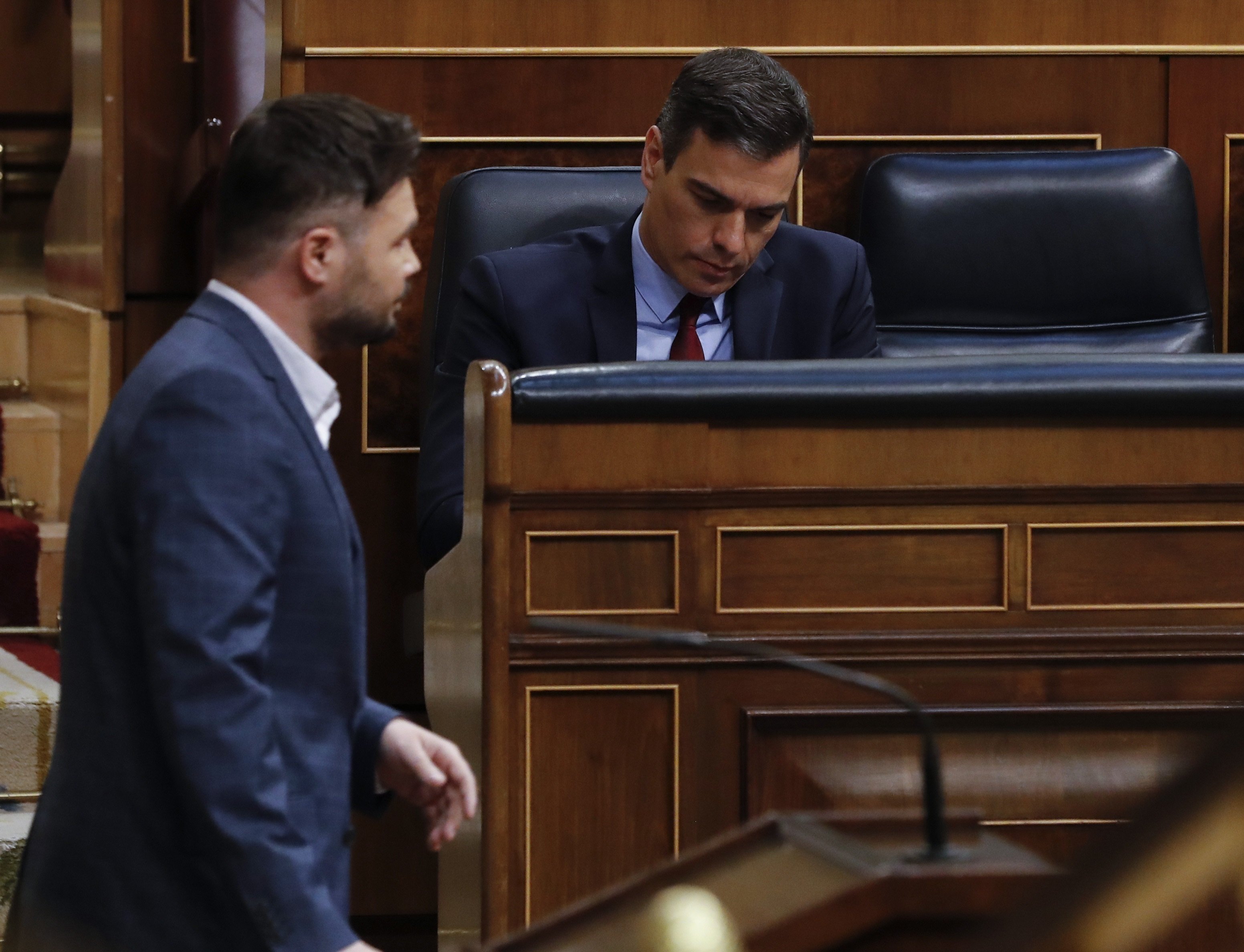Pedro Sánchez has managed to save the fifth two-week extension of Spain's state of alarm, the emergency status declared in response to the coronavirus crisis. It was not until the middle of this Wednesday's parliamentary session that he obtained the missing votes. Despite having opened negotiations with the Catalan independence parties, which went on until after midnight on Tuesday, his lifeline came from the same allies that pulled him out of the fire two weeks ago: the Ciudadanos (Cs) party of Inés Arrimadas and the Basque Nationalists (PNV). A formal agreement with the PNV was not even necessary this time. Along the way, however, the Spanish government has burned its bridges with the Catalan Republican Left (ERC), one of the key artifices of the moments that brought Sánchez to power: the 2018 no-confidence vote and the January 2020 investiture. Thus, the state of alarm will continue across Spain for at least another two weeks, until June 7th, although it is not so clear that the extension approved today will be the last.
The result was identical to that of two weeks ago in terms of sí votes, but with many more for no. There were 177 votes in favour, principally those of the PSOE, Podemos, Ciudadanos, the PNV, Més País. There were 162 votes against, those of the PP, Vox, ERC, JxCat, the CUP and Compromís. And there were eleven abstentions, including those of EH Bildu and one ERC deputy, Joan Josep Nuet. Two months ago, Sánchez obtained 321 votes in favour, none against and 28 abstentions.
Sánchez's speech to the chamber served to explain why the negotiations with ERC and JxCat failed, even after continuing till the early morning in the case of ERC: the Spanish PM put up a fierce defense of his single command, and refused to let it go. "No solution can come from disorder or division," he reiterated. Health minister Salvador Illa, working by consensus, will be the one to "set the pace for the de-escalation", he said. And he made a vague promise about the "prominence" of the autonomous communities - just as he did two weeks ago.
So, the Spanish government once again saved the furniture by looking to the right, to Ciudadanos, with whom it made a deal on Tuesday afternoon. The executive gave way to Cs' condition that the extension should last for 14 days instead of a month and accepted various economic measures. Meanwhile, Arrimadas's party boasted that it had paralyzed the dialogue table between the Spanish state and the government of Catalonia. Today, Sánchez was forced to make it clear that he "maintains the commitment" to dialogue which was key in bringing him to power. But he did not set a date for the next meeting of the dialogue table as requested by ERC.
The votes that were missing to secure the extension arrived two hours after the session began. The Basque Nationalists provided them, as they did two weeks ago, and this time without making any public agreement with Sánchez. Already with one eye on the Basque election scheduled for July 12th, spokesperson Aitor Esteban went over everything he has managed to get out of the Spanish government over the last two months.
Failed talks with independence parties
It's been several weeks since ERC's Gabriel Rufián had a good word for the coalition government. After today's second Sánchez-Arrimadas pact, the ERC spokesperson warned that "today, right here, we are seeing the fall, perhaps irretrievable, of the spirit of the investiture". He complained: “We called for co-responsibility in decision-making, assistance for the people, municipalism, protection of freedoms and dialogue. Dialogue in exchange for 13 votes. The answer was: no, we already have Ciudadanos”. Rufián was not even given a date for the next dialogue table meeting, as he had demanded.
Laura Borràs of JxCat certified the Sánchez shift to the right, as her party voted no for the third straight time in a state of alarm extension debate. “Making a deal once with Cs might be an accident; doing it twice might be a coincidence, but the third time is the new normal", she concluded. She had also entered into negotiations with the Spanish PM and they had also failed: "We hope that as a result we are now immune to his marketing and propaganda."
The CUP did not even sit down to negotiate. MP Mireia Vehí denounced that the Spanish government was maintaining the state of alarm "with an authoritarian, recentralizing logic and a control of public space as if it were a military instead of a health crisis."
Warnings from the loyal, battles on the right
It was very symptomatic that, this time round, Sánchez lost one of his most loyal allies of all: Joan Baldoví, MP for Valencia's Compromís, who voted against the proposal, while Íñigo Errejón, of Más País, made a very critical speech despite voting in favour. It was necessary to "take care of the partners", he warned, because the bloc that supported Sánchez's rise to government on those key dates in 2018 and 2020 was "fading".
Meanwhile, the Congress of Deputies was again a battleground between the PP and Vox, rivals to occupy the far right lane. PP leader Pablo Casado topped a whole series of strong criticisms by remarking that the PSOE "governs the community with the most deaths per inhabitant". But he could not beat Vox's Santiago Abascal, who accused the Spanish government of "reckless homicide" and threatened to pursue this matter in the courts: "Junqueras also laughed at Vox's allegations."
And it was left to Ciudadanos, having signed a second agreement with the Spanish government, to show centrality and "utility". The party tried to mark its own profile - neither part of the PP-Vox contest, nor rubbing up to the Socialists. "Make no mistake, you don't have a new partner," Cs spokesperson Edmundo Bal told Sánchez. "Comply with the agreements."

